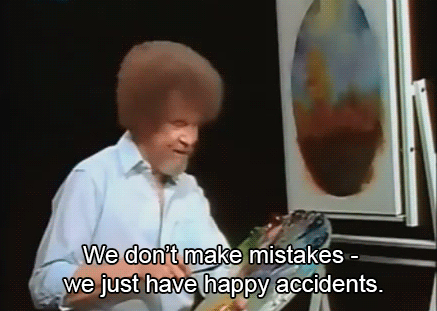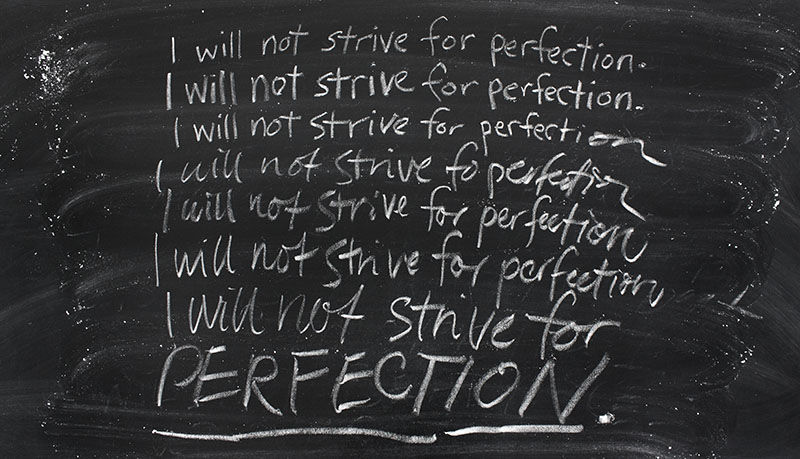Striving for perfection can get in the way during the early stages of the creative process. So don’t get stuck at the planning stage. Don’t let your inner perfectionist slow you down. All the overplanning, all the procrastinating, and all the talking are signs that we are afraid, that we just don’t feel ready. You want everything to be “just right,” before you commit further or share something with others. That tendency leads us to wait rather than act, to perfect rather than launch.
—Tom & David Kelley (in Creative Confidence)

I’m not really sure how to write this section because I suffer from what I call “Perfection Syndrome,” on a daily basis.
Disclaimer: I’m trying REALLY hard to fight this.
Perfection Syndrome keeps me from getting started. It keeps me from trying new ideas. It keeps me from doing a hundred iterations of one design. It forces me to think too long and too hard—then start too late and throw shit together at the last minute. It keeps me from getting to those solutions I’m really proud of, and from learning anything and getting better.
The first reason why we’re such perfectionists is that we have good taste.1 It’s awkward, frustrating, and disappointing when we make something that doesn’t live up to our personal standards. So we try to prevent this from ever happening by over-planning everything in hopes that we can skip the messy process of finding the solution through multiple failed attempts.
Perhaps we also do this because we're acutely aware of and overly-sensitive to our limited time. We’re incredibly impatient. Of course, if I did everything perfectly on my first try, I’d only have to do things once. But by attempting this—you corner yourself into a direction way too soon. Then you’re stuck—usually with a design that isn’t as great as it could be. Final solutions are rarely discovered at the beginning. Unless you’re really lucky (or Sagmeister).
I could compare all of this to trying to cook without getting your hands dirty. I can imagine that process would be much longer, much harder, and much less fun. There are a number of ways to “treat” this so-called Perfection Syndrome, though it might be hard on your ego.
What it really comes down to is taking a giant step in the other direction. Instead of striving to make something beautiful, be sloppy. On purpose. Don’t worry—on purpose. Be reckless2—on purpose. Stop judging yourself in everything you do for the sole purpose of getting to that solution that has just the right amount of wrong.3

Perfectionism does have its place in the design process, but almost always towards the end. The time to be a perfectionist is in the things that don’t necessarily require a whole lot of creativity, such as: aligning things, making minor typesetting tweaks, color-correcting, making sure to cut your pages straight, etc. Ironically, these are also the things that are most intuitive and easy to correct. For those of you that love to be perfect, well—there’s your chance!
For everything else, battling perfectionism means a constant rearranging of perspective. We need to apply this kind of thinking into everything we do—but specifically in the most creative moments of the design process: sketching, brainstorming, ideating, hypothesizing, questioning, iterating, etc.4 Creativity is a kind of intuition where perfectionism has no place. You can’t be creative when you’re constantly judging yourself. The end result is unknown and so the only way to get there is to essentially not know anything.

When you decide to "not know anything," you open yourself up to creative possibilities that your perfectionist self would never let you entertain. I can’t tell you how many times I’ve had something cool happen that was purely the result of an accident in the process. That’s the whole point too. It’s the beauty of mistakes and why they keep telling you to make them. The process is intended to be messy, fluid, even haphazard. Good things happen when you stop trying to be perfect. You make a ton of more work when you’re not afraid of the outcome.
Not knowing anything means you can dive head first into your project without having any idea of what you're getting into (and that's when the really good stuff happens). You get to be silly, childlike, risky, and overall—more creative.

An Interview with:
Hallie Walker (2016 grad)
1.Perfectionism can definitely be hindering to the design process. Can you talk about a time when you knew you needed to change your perspective? What happened?
I think it finally really clicked with me that I needed to change some of my work habits during the last term before my sophomore portfolio review. Building up and revising 8 projects at once is a herculean task if there ever was one and the urge is always there to keep going, keep working until you've driven yourself into the ground, until every thing is "perfect." At times I would be so focused on getting one piece of my portfolio so perfect that as a whole I let some other things fall by the wayside. It got to the point where I was getting close to my deadlines and definitely not sleeping or thinking like a functional human person. I had to take a big step back from all of it for a minute (which was a completely terrifying idea at the time), and force myself to think of it as a step in a process rather than something that was completely final/endgame/set in stone. I also had to force myself to talk to more people about my work and work habits, and actually making myself work on these projects around other people or in groups helped me let go of some things, and gave me a place where I could call things good and be happy with how they turned out even if it wasn't the exact picture of what I had been envisioning. It's insane how much of a difference it makes in your work habits when you are able to interact with something other than your own panicky thoughts.
2.How do you approach your work now? Is it hard for you to battle the tendency to be a perfectionist?
I honestly still have a really hard time with perfectionist tendencies, and I think I just have one of those brains that is obsessed with making everything be "right," even though in a way there is no such thing. It's something I fight against with every project I start, but I've also learned to recognize when I am getting too intensely stuck on things and what kind of focus is good versus what is unproductive. It's a side of me that I realized will probably always be there, so I'm trying to twist it to work in my favor as opposed to letting that perfectionism get the best of me. I've come to realize that a little bit of perfectionism can be a good thing, in the sense that it can help with things like being more detail oriented. However, just a little bit of it goes a long way.
3.Any advice for students who are struggling to produce work (without judging themselves)?
The smartest thing I've done so far is made myself some friend that I feel comfortable working with and asking for feedback. In my opinion, one of the best things a graphic design student can do is start to build themselves a community of peers that they can count on for support and feedback. That way they can have a nice little safety net of people who can recognize each other's work habits, as well as give and receive outside perspectives that can help keep a lot of that internal judgement and those perfectionist tendencies at bay. And for people who always struggle with that paralysis at the beginning (or middle or end) of a project, I think it's important to try and identify why something feels so impossible, what could be causing a sort of "perfectionist panic." A lot of the time it can be helpful to breaking a large project project down into smaller, more linear pieces. I like to make myself a timeline of more manageable work so that I have less of a chance of getting overwhelmed and freezing up; I need to do z, but I'll have to do x and y done in order for that to happen, so I'll start there and work up — x—> y —> z. Keeping things moving forward on a small scale not only helps people recognize when they are sliding into an obsessive perfectionism, but also makes it easier to see when they are being a little too judgemental toward themselves.